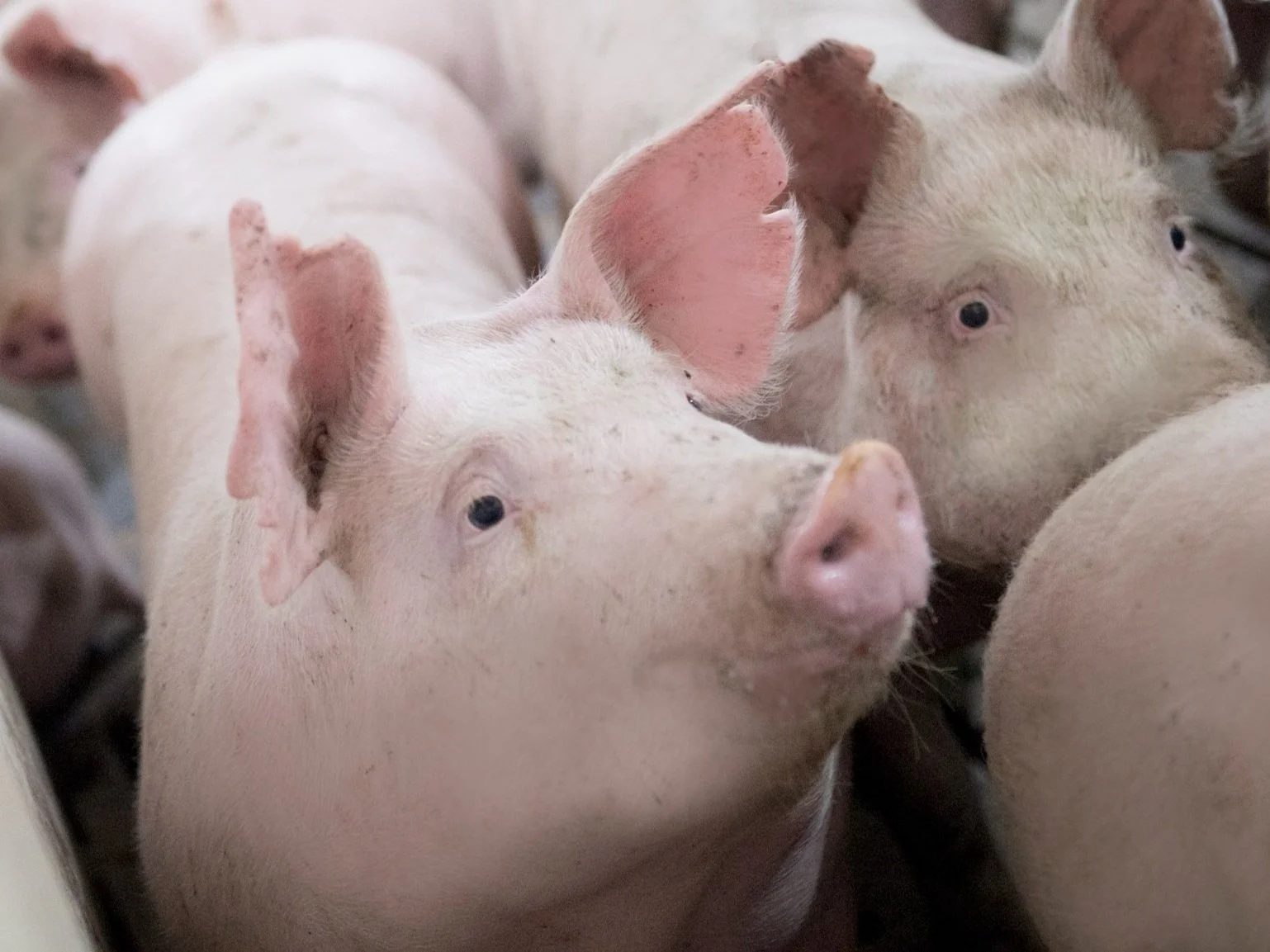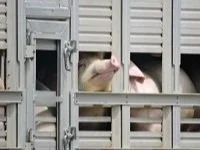Sask Pork's Whole Hog Youth Ambassador says the public needs to be aware that food doesn't just appear in the grocery store, it is produced through the hard work of farmers. Sask Pork’s Whole Hog Youth Ambassador Program, launched in January, is designed to bring youth into the discussion of how pork is produced and where our food comes from.
Read MoreThe General Manager of Sask Pork is suggesting the Canadian pork sector's dependence on exports makes the prevention and preparation for foreign animal disease critical.
Read MoreAn independent economic analysis has demonstrated money allocated to pork research in Canada is win-win for the pork sector and for government, finding the resulting advances improved the sector's productivity by three and a half percent. The analysis found the research is leading to better outcomes and technologies, such as new vaccines, improved genetics, better feeding strategies and better product quality, to name just a few.
Read MoreSaskatchewan's Minister of Agriculture says the cull line being incorporated into the North 49 sow slaughtering plant in Moose Jaw provides the infrastructure to deal with market disruptions triggered by a foreign animal disease. In response to the threat of African swine fever, the Government of Saskatchewan and Sask Pork have committed $1 million swine disease mitigation, including adding a dedicated cull line into the North 49 processing facility.
Read MoreSask Pork's Whole Hog Youth Ambassador says it's important for people to be more aware of where their food comes from and lots of other products too. Sask Pork’s just-launched The Whole Hog Youth Ambassador Program is a new agricultural education program designed to help share the story of pork production in spite of the biosecurity protocols that make communicating with consumers such a challenge.
Read MoreWith the support of the Saskatchewan Government and Sask Pork, North 49 Foods will be helping the western Canadian pork industry be better prepared to address foreign animal disease. The Government of Saskatchewan and Sask Pork have allocated $1 million to support the creation of a cull line at the North 49 Foods sow processing facility being built by Donald’s Fine Foods in Moose Jaw. Earlier this week, Saskatchewan Agriculture Minister David Marit announced $700,000 in funding to support swine disease mitigation efforts with Sask Pork providing $300,000 towards a swine market disruption plan, which will help industry respond to potential market closures due to an animal health emergency.
Read MoreSask Pork launched a new youth ambassador program today. The Whole Hog Youth Ambassador for 2023 will be 10-year-old Reise Podordeski of Marcelin, Saskatchewan. The Whole Hog videos will be released on the Sask Pork and Pick Pork social media channels and featured on the Sask Pork website. The videos will focus on basic consumer questions like “why do pigs usually live in barns” and more behind-the scenes content such as “what do pigs do for fun” and “why is the hog industry in Saskatchewan a big deal”.
Read MoreToday, Saskatchewan Agriculture Minister David Marit announced $700,000 in funding to support swine disease mitigation efforts. Sask Pork will also be providing $300,000 towards a swine market disruption plan, which will help industry respond to potential market closures due to an animal health emergency event such as African swine fever.
Read MoreThe Director of Risk Management with HAMS Marketing Services is advising pork producers to take advantage of strong futures and lock in prices as new highs are established on a lot of the spring and summer month contracts. As a result of reduced slaughter hog supplies due to health challenges in the U.S., 2022 has been among the three most profitable years for pork producers over the past decade.
Read MoreThe Regional Director of PIC EMEAR suggests a key lesson learned from the European African Swine Fever experience has been the value of advanced rather than reactionary planning for dealing with an outbreak.
"African Swine Fever: Learning from the European Experience," was one of sessions at the Saskatchewan Pork Industry Symposium in November in Saskatoon.
The creator of High Heels and Canola Fields says simple strategies can make a big difference when it comes to dealing with the everyday stresses that occur on the farm. "When Stress is More Than a Season" was the keynote address last month at the 45th annual Saskatchewan Pork Industry Symposium. Lesley Kelly, the creator of High Heels and Canola Fields, a mental wellness website, and a co-founder of Do More Ag, noted mental stress can result in physical symptoms but the signs will vary from person to person.
Read MoreA study underway in Saskatchewan will provide pork producers in Saskatchewan a clearer idea of which swine transport vehicle movement tracking technology works best on their farms. Guelph-based Farm Health Guardian and Sask Pork are collaborating on a pilot project to assess the performance of technologies designed to track swine transport vehicle movements.
Read MoreThe Strategic Advisor Agriculture with Workplace Safety and Prevention Services suggests an effective farm safety plan that that eliminates hazards should improve both the safety and productivity of the farm.
"Farm Safety: The Top 10 Greatest Risk Factors and How to Avoid Injury" was among the topics examined during the 45th annual Saskatchewan Pork Industry Symposium last month in Saskatoon.
A new initiative being developed by the Western College of Veterinary Medicine will help address the shortage of swine veterinarians across Canada. In response to the shortage, particularly in swine, the Western College of Veterinary Medicine is launching a new swine medicine advancement, recruitment and training, or SMART program.
Read MoreThe largest livestock show in Canada returned to Regina on Monday, November 28th and Sask Pork was on-site all week with ag education, cooking demos, and a charity partnership. Over the course of the week, Canadian Western Agribition opened its doors to approximately 120,000 attendees, including 1,200 international guests from 63 countries, and around 10,000 school children from urban and rural areas across Saskatchewan.
Read MoreSask Pork’s General Manager Mark Ferguson sat down with Saskatchewan Farmers’ Voice magazine to highlight what’s new in the hog industry, the biggest challenges producers are facing, and why others might want to add hogs to their farming operations.
Read MoreResearch conducted on behalf of Swine Innovation Porc indicates, in addition to influencing growth, the inclusion of amino acids in swine rations can influence gut health, gut development and immune function.
Read MoreThe Strategic Advisor Agriculture with Workplace Safety and Prevention Services says the key to maintaining a safe agricultural workplace is to have a plan and to make sure everyone believes in that plan and follows it. Dean Anderson told attendees at the Saskatchewan Pork Industry Symposium 2022, the sectors that face the greatest risks tend to be those that have the largest equipment without a formal health and safety program, including agriculture.
Read MoreWhen managing deadstock, pork producers are encouraged to consider their own location, management and biosecurity situations when deciding on the best option. "Alternative Methods for Deadstock Management" was a featured topic at the Saskatchewan Pork Industry Symposium in Saskatoon this year.
Read MoreA new cull sow slaughtering facility under development in Saskatchewan is expected to reduce shipping distances and costs for western Canadian pork producers while reducing the risk of the cross-border movement of swine disease.
Read More



















